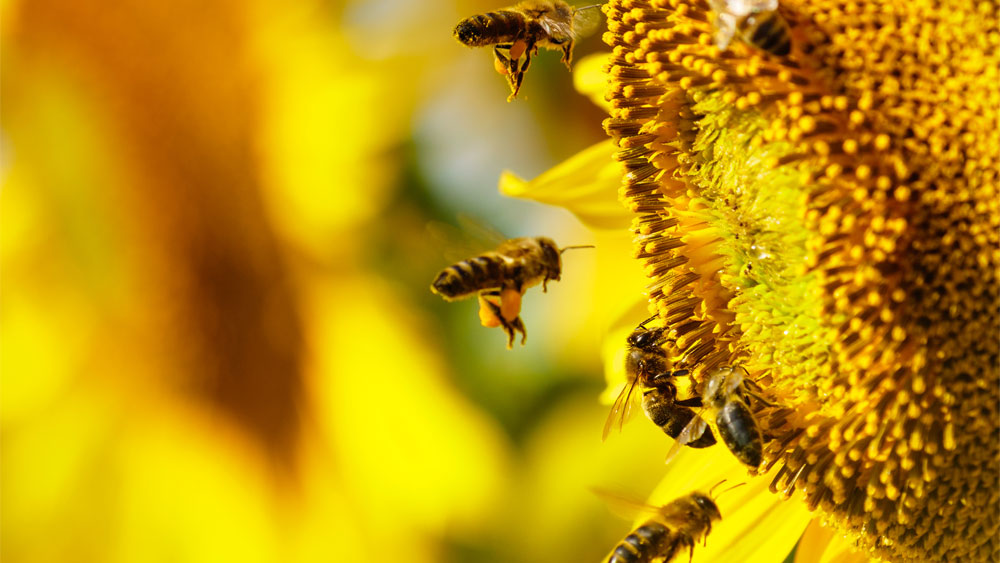The typical honeybee continues to amaze,1 if not flummox entomologists.
For example, a decade ago researchers from Macquarie University conducted a study that was “the first to demonstrate that even insects are capable of making complex and adaptive decisions.” Co-author Dr. Clint Perry stated, "The honey bees' assessment of the certainty of a predicted outcome was comparable to that of primates in a similar paradigm."2 Could random mutations and mindless selection by nature ever account for such neural complexity?
Several years ago, “research on bee behavior [showed] how bumblebees accelerate the developmental process of flowering plants when pollen-hungry bees are not satisfied with the ripeness of the plant’s blossoming. “When deprived of pollen, bumblebees will nibble on the leaves of flowerless plants. The damage done seems to fool the plant into flowering, sometimes up to 30 days earlier than normal.”3
Now, a recent study was conducted that demonstrates how sensory evidence (cues) and “reward likelihood quantitatively affect the decision-making process and the bees’ response time.”4
Bees do not loiter. They have been designed by the Lord Jesus to work quickly and efficiently to collect nectar. They make minimal energy-wasting mistakes, as documented by this research. For example, it was found that “[i]f the bees were confident that a flower would have food, then they quickly decided to land on it taking an average of 0.6 seconds.”4 But if the bees were unsure if a flower had nectar, it took an average of 1.4 seconds to investigate. Regardless, as one of the authors stated, “We think bees are using their flight movements to enhance their visual system to make them better at detecting the best flowers.”4
Not surprisingly, Macquarie University’s Professor Andrew Barron stated what many behavioral zoologists already know: “A honeybee has a brain smaller than a sesame seed. And yet she can make decisions faster and more accurately than we can. A robot programmed to do a bee’s job would need the back up of a supercomputer.”4,5
But how are these precise and fast decisions made?
The scientists trained 20 bees to recognize different colored flower disks. The University of Sheffield’s Dr. HaDi MaBouDi of England described the experiment.
A computer model was then designed to copy the insects’ decision-making process. What they discovered was that “their computer model looked very similar to the physical layout of a bee brain.”4
In other words, researchers are finding that it’s not necessarily the mass or sheer number of neurons (brain cells) in an animal such as the honeybee that accounts for the creature’s perception. It seems rather to lie in the bee’s neural circuits, specifically the circuits’ interconnectivity and modularity.6 It appears the neural circuits must be connected and arranged in a very detailed manner in order to function as optimally as they do. This incredible design can hardly be attributed to haphazard mutations7 over immense time periods.
Indeed, “Our study has demonstrated complex autonomous decision-making with minimal neural circuitry,” said University of Sheffield’s Professor James Marshall. “Now we know how bees make such smart decisions, we are studying how they are so fast at gathering and sampling information.”4
Bees making smart decisions and the amazing speed regarding their gathering and sampling of information doesn’t sound like the result of random mutations across their genome. Rather, it clearly shows8 the plan and purpose of our Creator, the Lord Jesus Christ.
References
- Sherwin, F. Bees are Actually Really, Really, Smart. Creation Science Update. Posted on ICR.org July 19, 2018, accessed July 12, 2023.
- Science Writer. Honey bees demonstrate decision making process to avoid difficult choices. Phys.org. Posted on phys.org November 5, 2013, accessed July 16, 2023.
- Johnson, J. Hungry Bumblebees Hurry Pollen Production. Creation Science Update. Posted on ICR.org May 30, 2020, accessed July 12, 2023.
- News Staff. New Research Reveals How Honeybees Make Fast, Accurate Decisions. Sci.news. Posted on sci.news July 10, 2023, accessed July 15, 2023.
- Thomas, B. Bees Solve Math Problems Faster Than Computers. Creation Science Update. Posted on ICR.org November 2, 2010, accessed July 12, 2023.
- Chittka, L. and J. Niven. 2009. Are Bigger Brains Better? Current Biology. 19 (21): R995-R1008.
- Tomkins, J. Random Mutations Debunked by Secular Scientists. Creation Science Update. Posted on ICR.org February 3, 2022, accessed July 12, 2023.
- Romans 1:20
* Dr. Sherwin is science news writer at the Institute for Creation Research. He earned an M.A. in zoology from the University of Northern Colorado and received an Honorary Doctorate of Science from Pensacola Christian College.






















